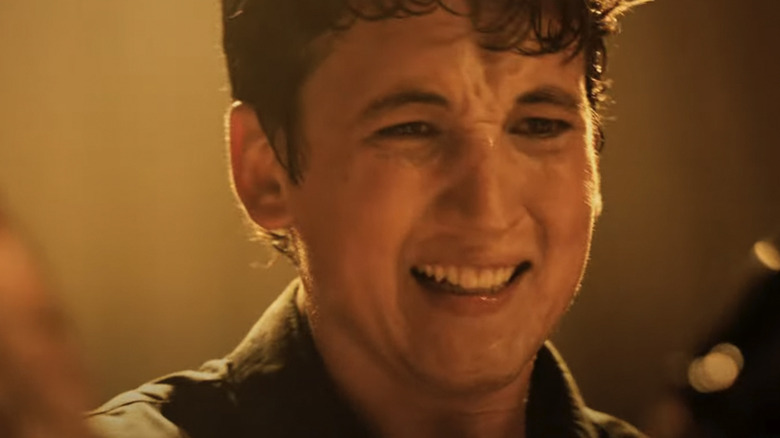A Clueless Studio Exec Tried To Cut The Drumming From Whiplash
As movie fans, it's fun to make fun of studio executives for giving terrible notes to filmmakers. It's tempting to think of Hollywood as a town full of creatives who are constantly being held down by business-minded execs who wouldn't know great art if it smacked them in the face. There's an underdog quality to that mentality, an "us vs. them" dividing line where we, as an audience, can side with who we perceive to be the oppressed parties — the storytellers who are sometimes able to sneak incredible moments past the morons upstairs and deliver their uncut vision to the screen.
The reality, however, is probably much more nuanced than that. It's rare that we hear about great studio notes that saved filmmakers from their worst instincts, but they likely happen more often than we know. (One good example involves the ending to Kevin Smith's "Clerks," which, without a studio note, would have ended with Dante being murdered.) As easy as it is to assume all executives are idiots, they can't all be brainless dillweeds who only care about saving a buck and preserving their own jobs.
OK, now that I've said some nice things about studio execs, let's talk about a couple of those dillweeds and their terrible notes.
In 2017, The Wrap asked a selection of Oscar-nominated screenwriters to share the worst studio notes they'd ever received. Damien Chazelle, the writer/director of "La La Land," explained that while making his breakout movie, 2014's "Whiplash," he got an all-timer of a bad studio note about the incredible ending to that film:
"It was on 'Whiplash,' it ends with a kind of long drum solo, which was the whole point of making the movie. And the note was to get rid of all that. The note was written out — 'He's good at drumming. We get it.'"
Talk about missing the point
I've seen "Whiplash" a handful of times, and watched this specific clip probably about a dozen times, and I just got chills watching it again. The fact that an executive could suggest cutting this moment — the confrontation/performance/cathartic payoff/tragic ending the entire story had been building toward — is so boneheaded, this guy must have been a friggin' pachycephalosaurus. Needless to say, since this moment made /Film's 15 Favorite Moments of the Decade list, we're thrilled that note was not enforced.
Meanwhile, in that same article, producer Todd Black explained his own run-in with an awful studio note:
"We made a Western called 'The Magnificent Seven' [with Sony Pictures]. And the biggest note in development and shooting it was, 'Do they have to wear cowboy hats and have facial hair?' And I said, 'Do you not want them not to have horses either?' That was a huge note on a daily basis."
Personally, I'd argue there were many reasons not to remake "The Magnificent Seven," but an abundance of cowboy hats and facial hair would not be among the top 50. Filmmakers all deal with studio notes in their own ways, of course, but for a particularly instructive manner of handling them, check out the methodology comedy legend Mel Brooks has developed over his long career.
